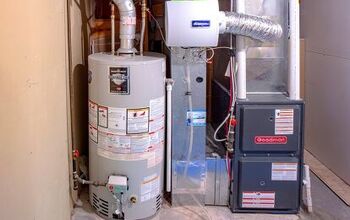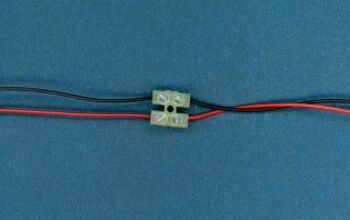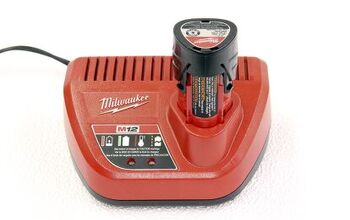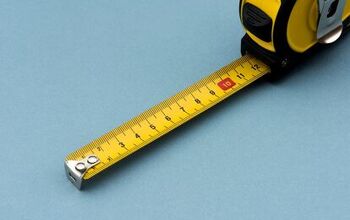Laundry Detergent Alternatives (Cheap & Natural Options)

When you go to the grocery store, there are countless laundry detergent options to choose from. Whether it’s Gain, Bounce, Tide, Cheer, or Seventh Generation, most people have a favorite brand of laundry detergent. What if you’ve run out of your favorite laundry detergent and need to have a certain piece of clothing washed immediately?
While your best bet is to hand wash when you just have a few items, you may need to do an entire load of dirty laundry. If this is the case, you’ll need a safe alternative to your usual detergent that will still effectively clean your clothes.
For many other people, none of the conventional laundry detergent options have ever worked for them. Perhaps you or one of your family members have very sensitive skin that is easily irritated by the chemicals found in commercial laundry detergent or you just want to find a more eco-friendly way to wash your laundry. All are incredibly valid reasons to find an alternative to conventional laundry detergent.
Some of the options you have to choose from for laundry detergent alternatives include baking soda, vinegar, lemon juice, dishwashing liquid, body wash, and even vodka.
10 Laundry Detergent Alternatives
The effectiveness and affordability vary from product to product. However, we’ve taken the time to assemble all of the alternatives you can choose from, along with some tips and tricks to help you achieve the best clean without the need for traditional laundry detergent!
1. Baking Soda
Baking soda has a long-standing history as an effective multipurpose cleaner for everything from brushing your teeth to cleaning your hands. When it comes to your clothing, baking soda can really come in handy by effectively removing oils and acids. Not to mention, it’s also great for removing odors, making it the ideal solution for smelly gym clothes, rags, undergarments, and more.
Most importantly, baking soda is entirely safe for use in your washing machine. The chemical composition does not create excessive suds when it is mixed in with cold or hot water. It also dissolves easily in water, which prevents buildup inside the internal piping of your washer.
Overall, baking soda is an excellent long-term alternative to laundry detergent. In fact, many homeowners swear by using this method, especially since it’s so cheap! It’s also widely available and can be found at every grocery store, regardless of where you live.
Quick Tip: To give your clothes a pleasant scent boost when washing with baking soda, consider adding in some essential oils. This is safe to do with all regular types of clothing and will leave them smelling like they were washing with conventional laundry detergent.
2. Lemon Juice
Lemon juice (and lime juice) are another common suggestion for an alternative to detergent. While this option can work in a pinch, it isn’t recommended to be used long-term. Over time, the strong acidity of lemon can cause damage to fabrics and may even bleach dark colored clothing. Not to mention, it can be difficult (and pricey) to acquire enough lemon juice to wash a whole family’s worth of clothes.
On the other hand, the acidic nature of lemon does work well at brightening whites and breaking down stains. You can even enhance this benefit more by adding in a bit of table salt to the mixture. Lemons can be found year-round at most grocery stores.
However, you should never use artificial lemon juice for cleaning your laundry. These products often have additives and colors that will cause staining when used for cleaning your clothing in the wash. With that said, here is the best method for using lemon juice as an alternative to traditional laundry detergent:
- Mix three cups of water with 1/3 cup of real lemon juice to dilute it.
- Add this mixture into your washing machine during the wash cycle.
- Alternatively, you can add 1/3 cup of real lemon juice directly into the bleach dispenser.
3. Vinegar
Another popular multipurpose cleaning product, vinegar was likely used by your grandmother as an effective laundry detergent alternative. The mild acidity of vinegar, especially white vinegar, is excellent at remove stains and unpleasant odors. Not to mention, it doesn’t leave behind any unsightly residue on dark clothing after rinsed and dried.
Your clothes will be both whiter and brighter after using vinegar to wash them. It’s also really efficient at breaking down mildew on various fabrics, removing the lingering odor. Comparably, smoky smells can be eradicated by simply dropping about a cup of vinegar into a load of laundry.
White vinegar is easily found at most supermarkets, and often in large volumes. As an added bonus, you can dilute your white vinegar with water and use the solution as effective household cleaner. However, always avoid dark colored vinegars as they will cause immediate staining to your fabrics.
For best results, follow this method for using vinegar as an alternative to laundry detergent:
- Measure out ½ cup of white vinegar and add it directly into the washing machine tub.
- Alternatively, you can add the same amount into your washing machine’s detergent dispenser.
- For a more effective clean, add up to one full cup of white vinegar.
4. Borax
Another old-fashioned cleaning agent, Borax is a fairly useful alternative to laundry detergent. It has a very simple formula that works great at removing odors and stains from bright fabrics. In fact, many pet owners swear by Borax for its’ effectiveness at removing odors and colors caused by pet urine stains.
Though, Borax does have one significant drawback. Even if you add it into your washing machine in small quantities, it tends to leave behind a white deposit on both your clothing and the machine itself. Although you can easily rinse this residue away, it adds an unnecessary step to the whole process.
Like most other options on this list, Borax is widely available and can be found in the home cleaning department of your local grocery store. Or, you can purchase the product in bulk online. To effectively use Borax as an alternative to laundry detergent, use one of the following methods:
- Pre-soak your laundry in a mixture of 1 tablespoon of Borax to one gallon of water for about 30 minutes. Then, rinse and wash as normal.
- Add no more than ½ cup of Borax during the pre-wash cycle.
5. Dish Washing Liquid
The effectiveness of dish washing liquid as an alternative to conventional laundry detergent will depend on who you ask. While many attest that it works just as well, others claim that it foams excessively even when just a small amount is applied. Regardless, dish washing liquid remains affordable and easy to use.
Before you consider this option, make sure that your washing machine doesn’t discourage dish soap from being used. Many dish washing liquids are not “High Efficiency,” meaning they bubble much more than others. As a result, you could end up overflowing your washing machine.
If you’re uncertain, it may be best to avoid dish washing soap entirely, unless you intend to just hand wash your clothing. In that case, use only a small amount per load – roughly the same amount you’d use when washing your dishes.
6. Shampoo
In a pinch, many people claim to have had success with washing their clothes using shampoo. While this may work in an emergency situation, these types liquids generally should never be placed into your washing machine. Like dish washing liquid, shampoo will create excessive foam, which can result in overflowing in the unit and a huge mess in your laundry room.
Instead, if you choose to use shampoo to wash your clothes, use small amounts when hand washing. After you’ve finished washing, rinse your clothing thoroughly to prevent the soap from adhering to the fabric and leaving residue. Also, it’s important to note that shampoo is not an effective method for removing stains.
Avoid using a combination shampoo and conditioner or any type that is intended to tint your hair. Opt for a gentle type of shampoo, such as baby shampoo, and only use about a teaspoon per bathroom sink-full of water.
7. Body Wash
Like shampoo, you can grab a bottle of body wash to hand wash your clothing in an emergency. With that said, it is highly advisable that you avoid putting body wash into your washing machine. Also, choose a wash that doesn’t contain any additional moisturizers, only use a small amount, and rinse your clothing thoroughly after washing.
Both shampoo and body wash are not long-term laundry detergent alternatives. Instead, only use them in a pinch and for hand washing purposes.
8. Bar Soap
Like both body wash and shampoo, bar soap seems like it would be a clear alternative to conventional laundry detergent. However, like the other aforementioned options, it is best used for hand washing only. Although bar soap can help to remove odors and some not-so-stubborn stains, its’ chemical structure causes it to foam up quite a bit. This presents a huge risk when you use it in your washing machine.
Instead, to use bar soap for hand washing your clothing in a pinch, simply wet the bar and apply it to stains before lathering. It is also necessary that your clothing is properly rinsed afterward to avoid white residue on the fabric. Alternatively, you can shave off some of the bar soap, melt it in hot water and submerge your clothing.
Quick Tip: If you decide to use bar soap in place of laundry detergent, make sure you choose the gentlest option possible. Avoid using bar soaps that contain any oils or skin softeners. Also, if the soap feels dry on your skin, it’s not gentle enough to be used on your clothing.
9. Soap Nuts
Soap nuts are essentially the dried husks that come from the soapberry nut, which come from a unique tree found in both the eastern and western hemispheres. Although they are called “nuts” they are technically dried berries. Believe or not, soap nuts are one of the oldest forms of laundry detergent. In fact, they date back all the way to ancient times in both China and India.
The shells of soap nuts contain a natural type of soap, called Saponin. When the shells of the nut absorb water, the saponin is released and creates a sudsy effect. Saponin is completely natural and biodegradable, making soap nuts an excellent eco-friendly option to traditional laundry detergent. You can also reuse your soap nuts multiple times before they stop being effective.
As an added bonus, soap nuts are allergy-friendly. They do not contain any synthetic chemicals. This means that if you are sensitive to a particular chemical found in laundry detergent, you won’t have to worry with soap nuts!
10. Vodka
Odds are you may have heard about this laundry detergent alternative from an old college buddy. Yes, vodka can and has been used in cleaning clothing in dire emergencies. With just a few sots of vodka, you’ll be able to effectively disinfect your fabrics during your normal wash cycle.
Unfortunately, disinfecting is about as far as vodka goes when it comes to cleaning your clothes. It won’t be very effective at lifting stains. Not to mention, it’s much more expensive that many of the other alternatives on this list. However, if you want to try using vodka as an alternative to traditional laundry detergent, you can pick some up at any local liquor store or raid your very own liquor cabinet.
Obviously, do not use any flavored vodka and make sure it is completely clear to avoid creating unnecessary stains. Here are some ways you can use vodka to disinfect your clothing in a pinch:
- Add multiple 3 fluid ounces of vodka to your washing machine during the wash cycle.
- Make a solution that is one part water and one part vodka and add it to a spray bottle. Spray the solution onto your clothing and hang them out to dry.
If done right, the vodka will disinfect your clothes without leaving behind any alcoholic or musty odors. For best results, only use this method for your clothing that could use a quick refresh.
Related Guides

Jessica considers herself a home improvement and design enthusiast. She grew up surrounded by constant home improvement projects and owes most of what she knows to helping her dad renovate her childhood home. Being a Los Angeles resident, Jessica spends a lot of her time looking for her next DIY project and sharing her love for home design.
More by Jessica Stone



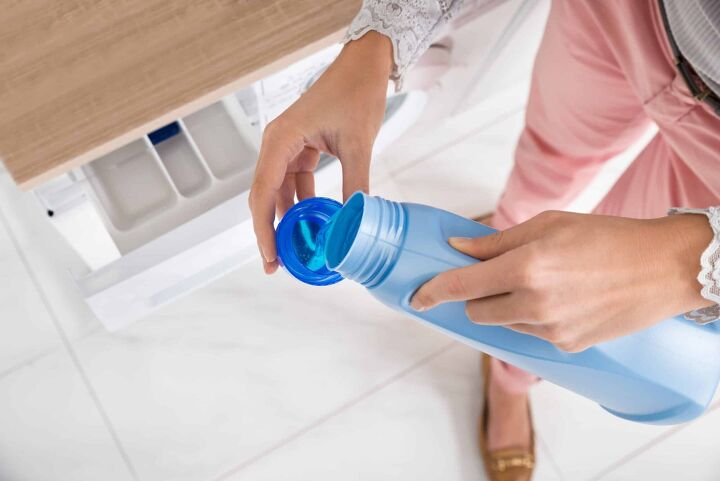







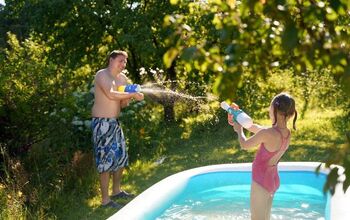





![10 Best Cordless Leaf Blowers – [2022 Reviews & Ultimate Guide]](https://cdn-fastly.upgradedhome.com/media/2023/07/31/9070789/10-best-cordless-leaf-blowers-2022-reviews-ultimate-guide.jpg?size=350x220)

![10 Best Scroll Saws for 2022 [Ultimate Reviews & Buyer's Guide]](https://cdn-fastly.upgradedhome.com/media/2023/07/31/9070684/10-best-scroll-saws-for-2022-ultimate-reviews-buyer-s-guide.jpg?size=350x220)


